The 9 best bath towels, tested for absorbency and softness
Take cleanliness, add godliness, and you've got the best bath towels

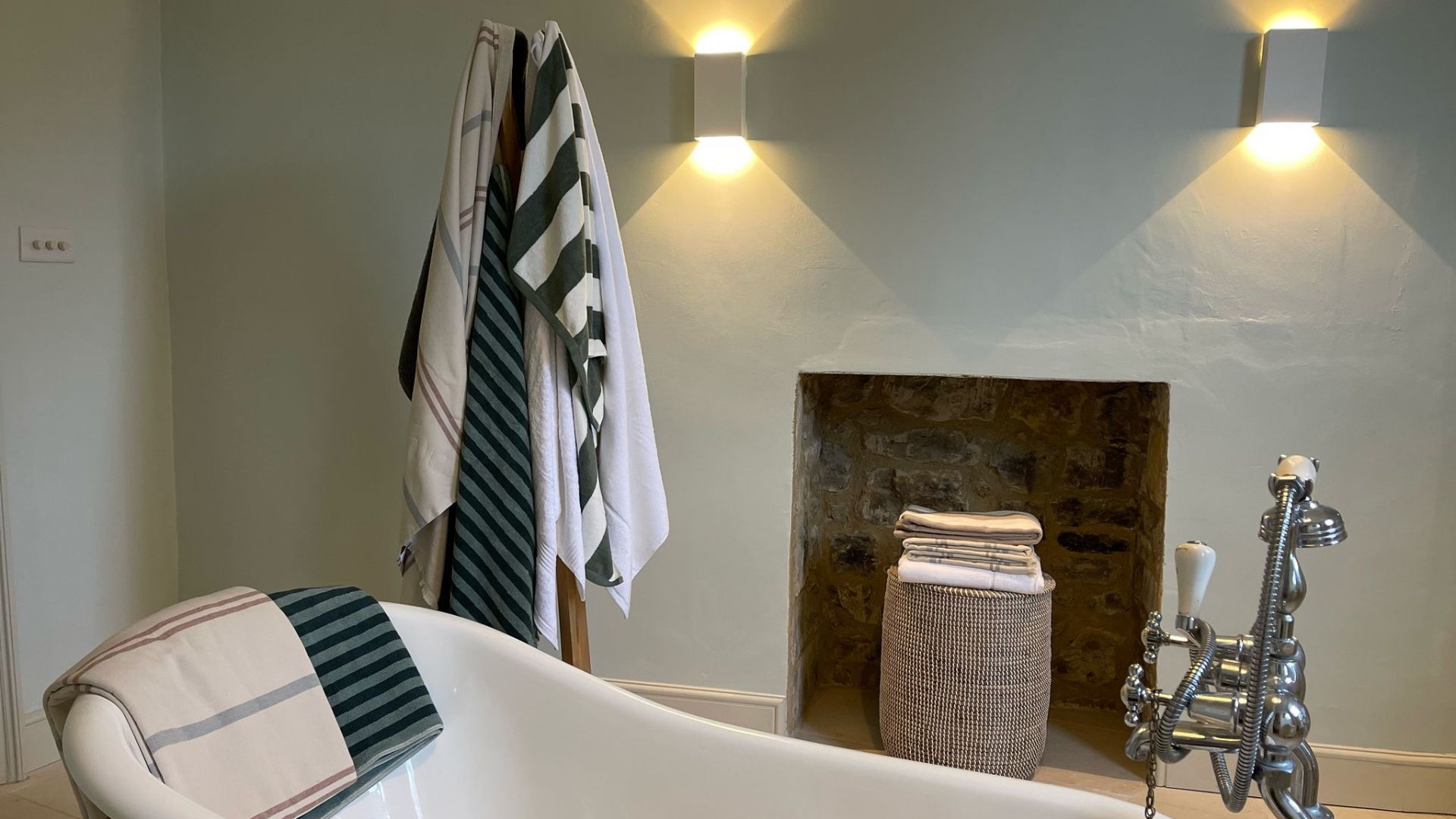
Sign up to our free daily email for the latest royal and entertainment news, interesting opinion, expert advice on styling and beauty trends, and no-nonsense guides to the health and wellness questions you want answered.
You are now subscribed
Your newsletter sign-up was successful
Want to add more newsletters?

Daily (Mon-Sun)
woman&home Daily
Get all the latest beauty, fashion, home, health and wellbeing advice and trends, plus all the latest celebrity news and more.

Monthly
woman&home Royal Report
Get all the latest news from the Palace, including in-depth analysis, the best in royal fashion, and upcoming events from our royal experts.

Monthly
woman&home Book Club
Foster your love of reading with our all-new online book club, filled with editor picks, author insights and much more.

Monthly
woman&home Cosmic Report
Astrologer Kirsty Gallagher explores key astrological transits and themes, meditations, practices and crystals to help navigate the weeks ahead.
I live my life by the aphorism cleanliness is next to godliness — and if that's true, then consider me practically angelic post-bath. A hot soak, soothing salts, and a decent cleanser will take you most of the way there, but it’s the final flourish — the bath towel — that really seals the deal. Choose right, and you’re cocooned in a cloud of softness. Choose wrong, and you’re left rubbing at damp limbs with something scratchier than divine.
Here's where you can ask me and the experts. I've interviewed towel brands, five-star hotels, and tested the best bath towels to find the perfect towel for you. In short, a great towel should be plush yet practical — thick enough to absorb every drop in seconds, but soft enough to feel like a five-star hotel hug. It's an easy way to make your bathroom look expensive.
I'll go into the details of why you might want 'long staple' cotton as well as an explanation of GCM and how often you should wash your towels further down the guide. So, whether you're looking to gen-up on your towel terms, or you simply want a bath towel that won’t scrape off your fake tan or go stiff in hard water, the towels below are the crème de la crème of the bathroom world. Get ready for godliness.
The best bath towels, tested for superior softness and absorbency
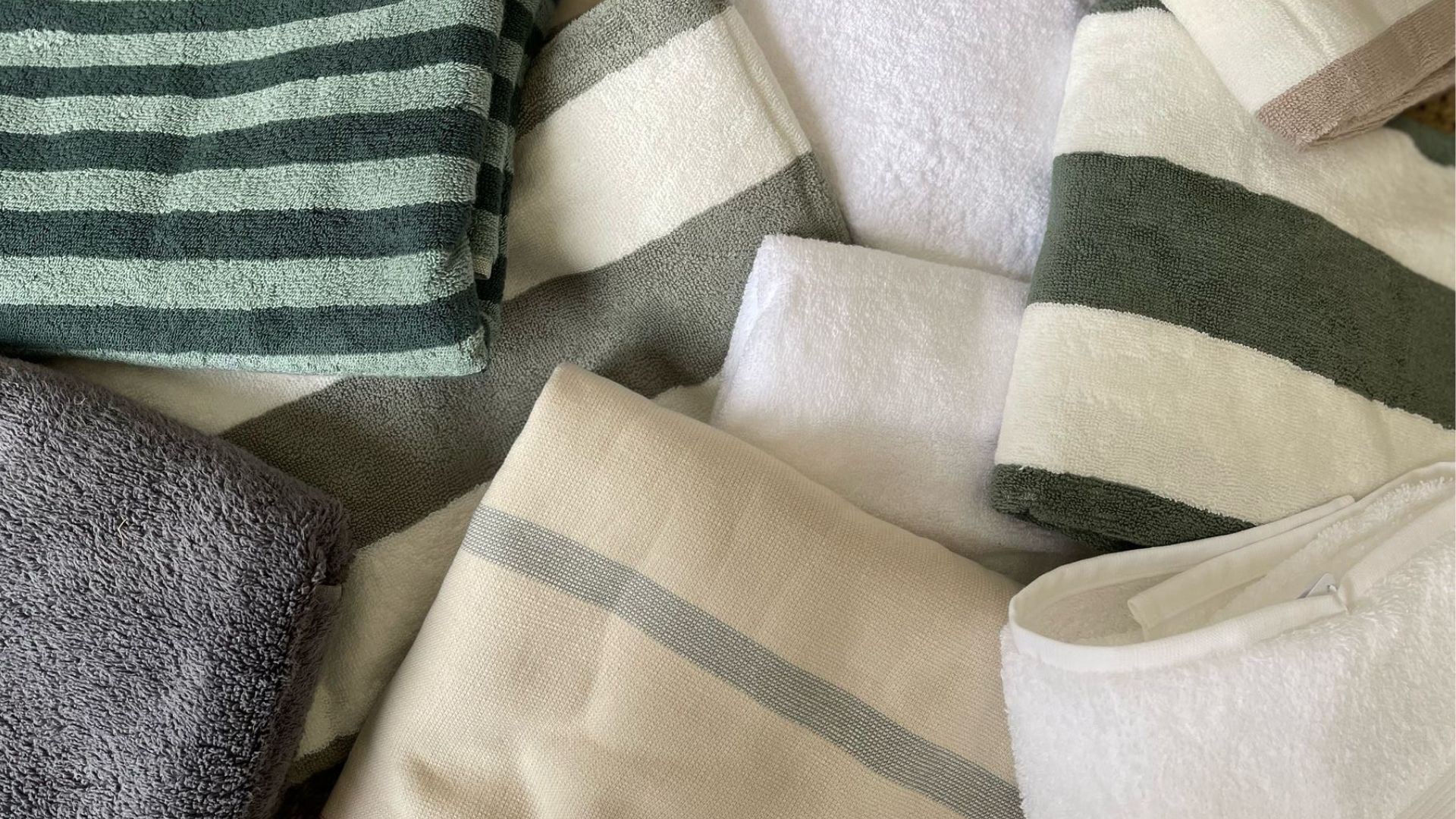
I promised that I would explain a few of the technical terms before we get into the nine best bath towels that I've ever used, so here's a mini explainer on the terms that you might see, answered by the experts.
- GSM: this stands for grams per square metre. Robert Lancaster Gaye, co-founder of Tielle, explains, “Towel weight is an indication of a towel’s quality and absorbency. The higher the GSM the more luxurious the towel.” Hotel-grade towels, for example, often fall in the 500–700 GSM range to provide a plush, indulgent experience.
- Zero twist: Zero-twist towels are made using fibres that haven’t been twisted during the manufacturing process — and that’s a good thing. Tommy-Joe Reardon, Head of Marketing at Panda, explains: “Zero-twist is a marker of incredible quality: it means every individual loop of the towel is left over, rather than being twisted or spun. This results in fluffier, more absorbent towels that are highly durable and really soft.”
- Egyptian vs Turkish: Tommy-Joe Reardon, Marketing Director at Panda London, makers of bamboo towels, “Egyptian cotton towels are typically very plush and thick, while Turkish cotton is smoother and lighter. When it comes to absorbency, Egyptian cotton comes out on top – but Turkish cotton towels dry quicker.”
- Long-staple cotton fibres: these longer, smoother, and more durable than regular cotton fibres Robert Lancaster Gaye explained that "these fibres not only make towels softer and stronger, but they also help reduce pilling and fraying, meaning your towel stays luxurious wash after wash."
Now we've tackled the technicalities, let's get into the best bath towels that I tested.
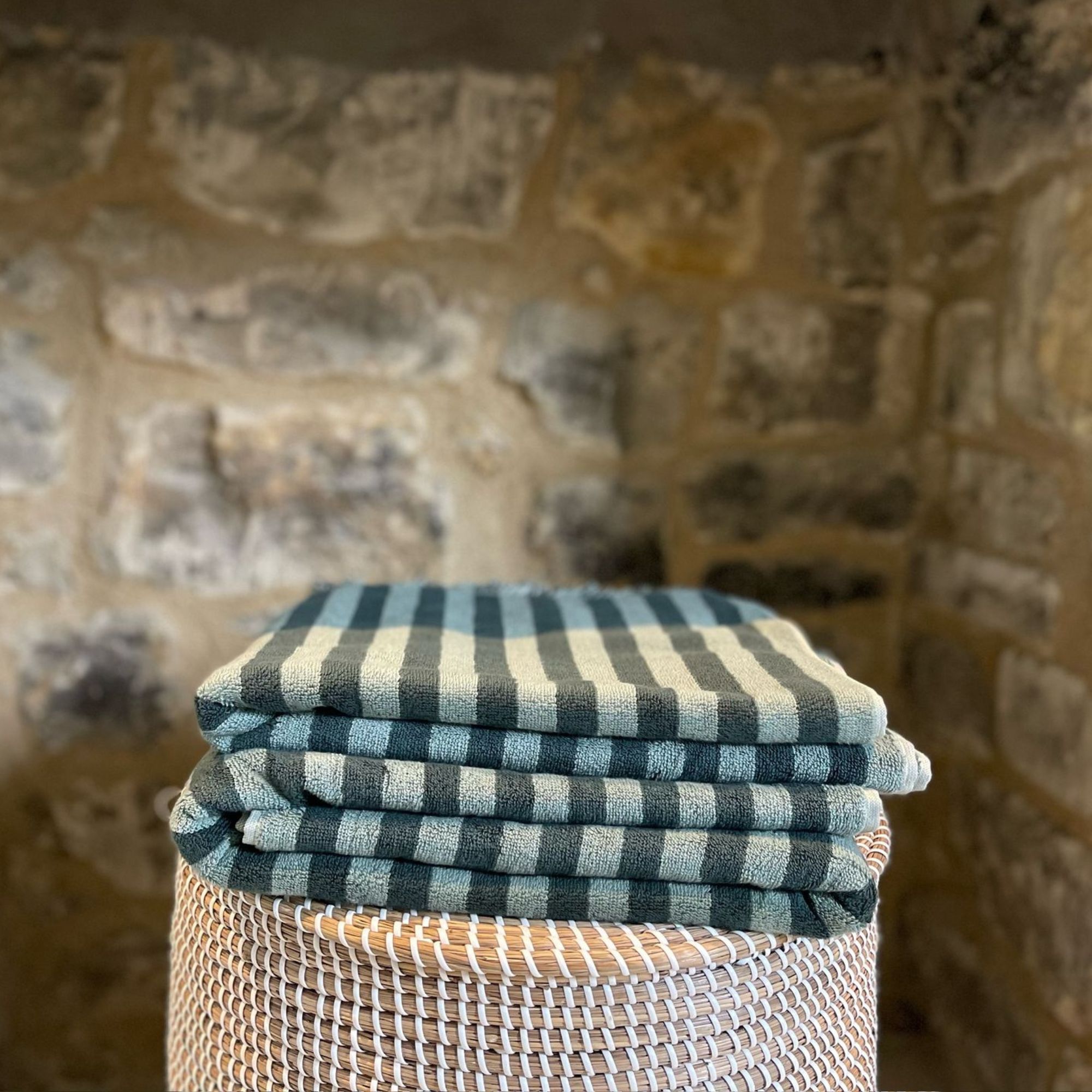
RRP: £24 | Material: cotton | Dimensions: 70 x 130 cm | Colour options: red, green, pink | GSM: 600
+ Crafted with absorbent, sustainable cotton
+ Gentle on sensitive skin
+ Colourful, nostalgic design
The nostalgic charm of these striped towels isn't just sustainably-sourced-cotton deep. These are the softest, most absorbent towels that I tested and if you dig into the details, you'll see why. The cotton that they're crafted from is zero-twist and it's packed in at 600 GSM, so you have lots of surface area to help wick away moisture. They're stylish, durable, and available in a range of beautiful colours. It's easy to see why they're my top pick.
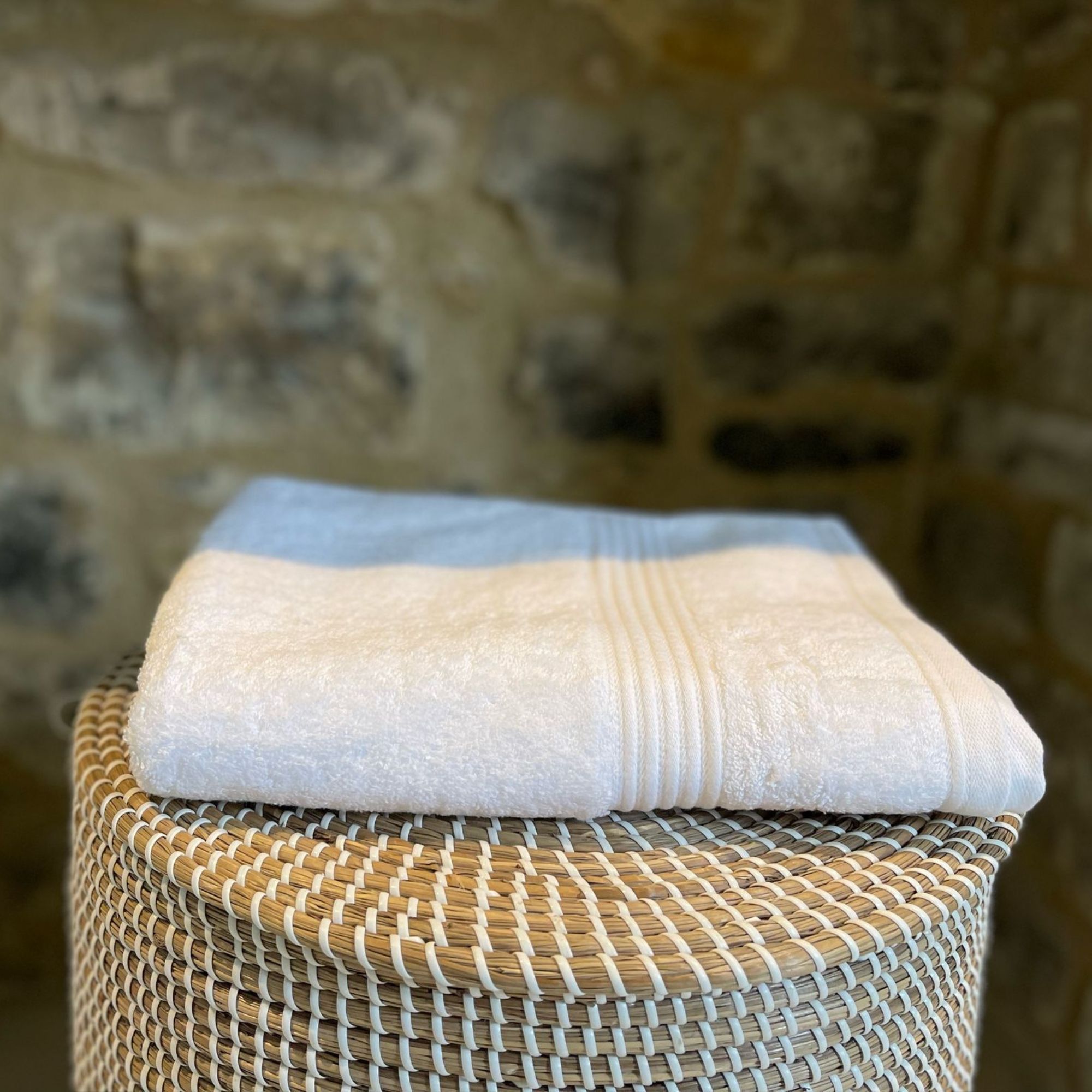
RRP: £20 | Material: Turkish Combed Cotton | Dimensions: 70 x 140 cm | Colour options: xx | GSM: 650
+ Feels luxurious and plush
+ Custom embroidery option
- Expensive
Nothing says luxury quite like hotel-style Turkish Combed Cotton. Throw in personalised embroidery and you've got the epitome of indulgence with Tielle's towels. These are super-thick, exactly like the kind you'd find in an expensive spa, and they're reasonably priced too. Tielle also pre-steam the cotton, so that it's supple and super soft, ready for when you step out of bed.
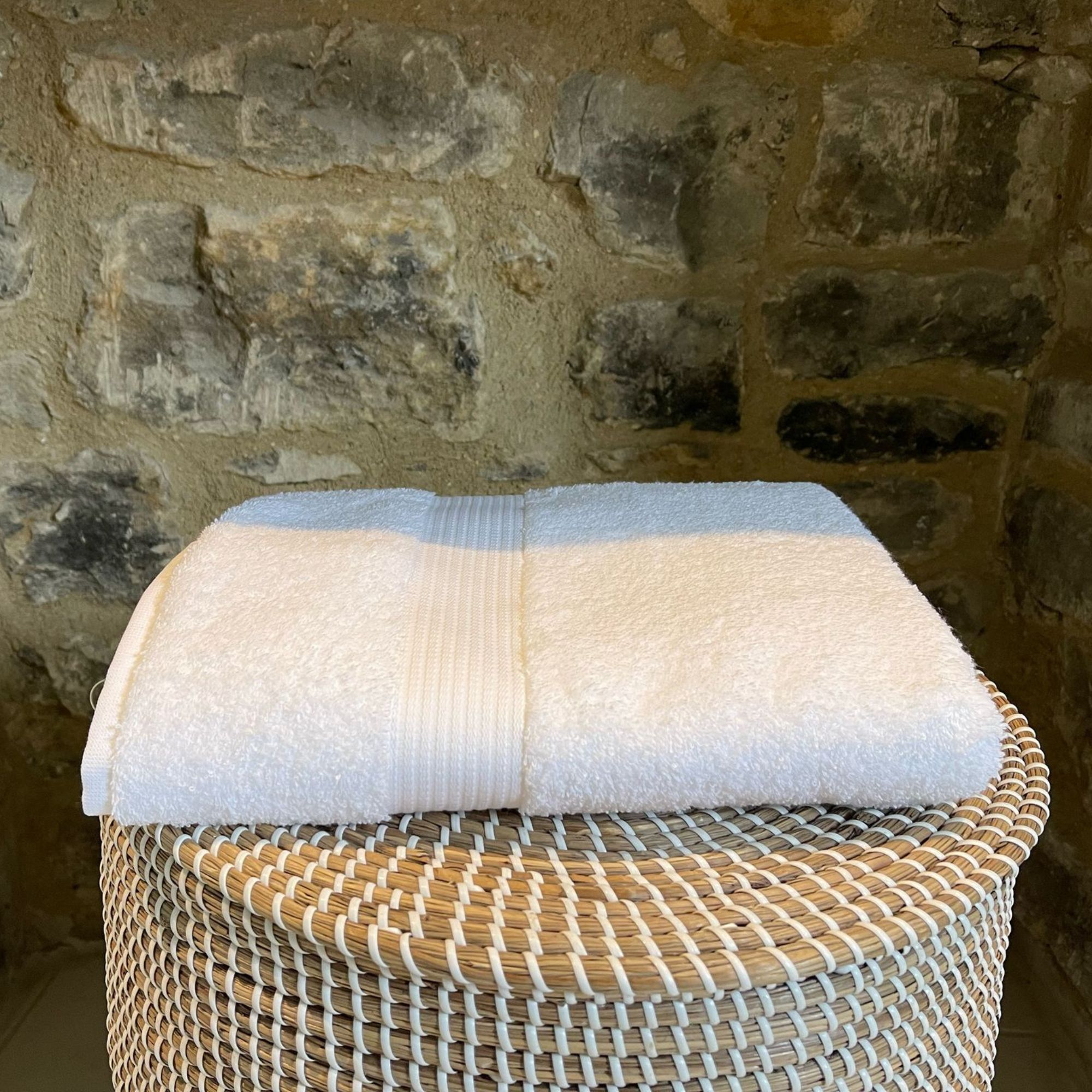
RRP: £26 | Material: Egyptian cotton | Dimensions: 70 x 125 cm | Colour options: soft grey, slate grey, feather grey, oatmeal, white | GSM: 700
+ Incredible quality and longevity
+ Classic, timeless design
- Limited colour options
My family has had these Egyptian cotton towels for twenty five years. Some say we should treat ourselves and splash out on some new towels, but those people clearly haven’t come to stay at the Honey house. These towels are still as soft and lovely to step into as they’ve ever been. The classic design is available in a range of useful colours and it still feels heavy, soft, and absorbent after hundreds of washes. Buy yourself a set and if they don’t last you like mine have — well, I’ll eat my towel.
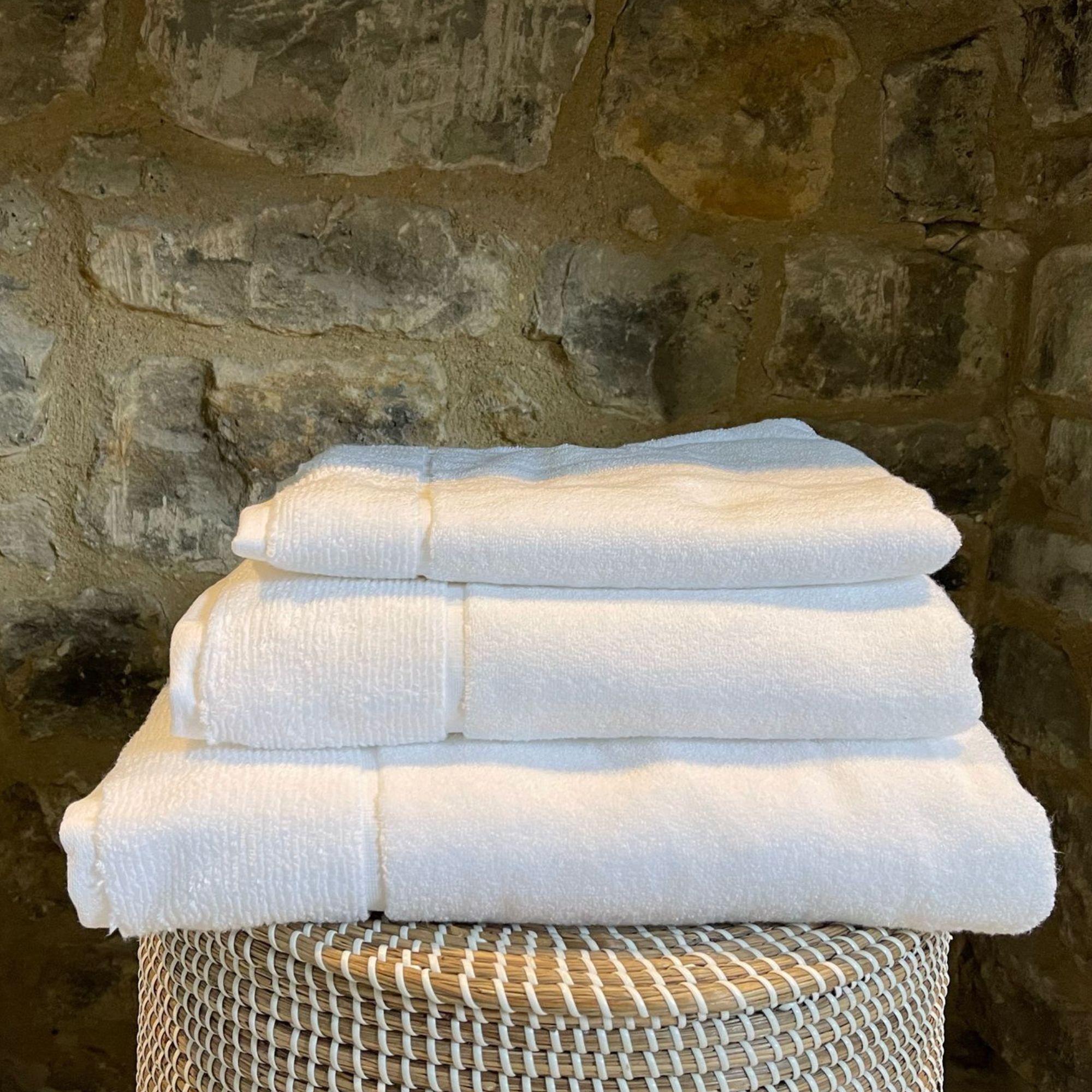
RRP: £45 | Material: bamboo and cotton blend | Dimensions: 70 x 130 cm | Colour options: white, grey | GSM: 700
+ The softest towels I tested
+ Wonderful alternative to pure cotton
- Shows up fake tan marks
Bamboo and cotton blends are perfect for sensitive skin, especially if you want to look after the environment too. They have the highest GSM in this guide and you’ll feel that in just how absorbent and soft they are (and stay), plus they’re naturally anti microbial and anti bacterial anti fungal and odour resistant. Up against Egyptian cotton, I don’t think you’d notice a difference. If anything, this is softer.
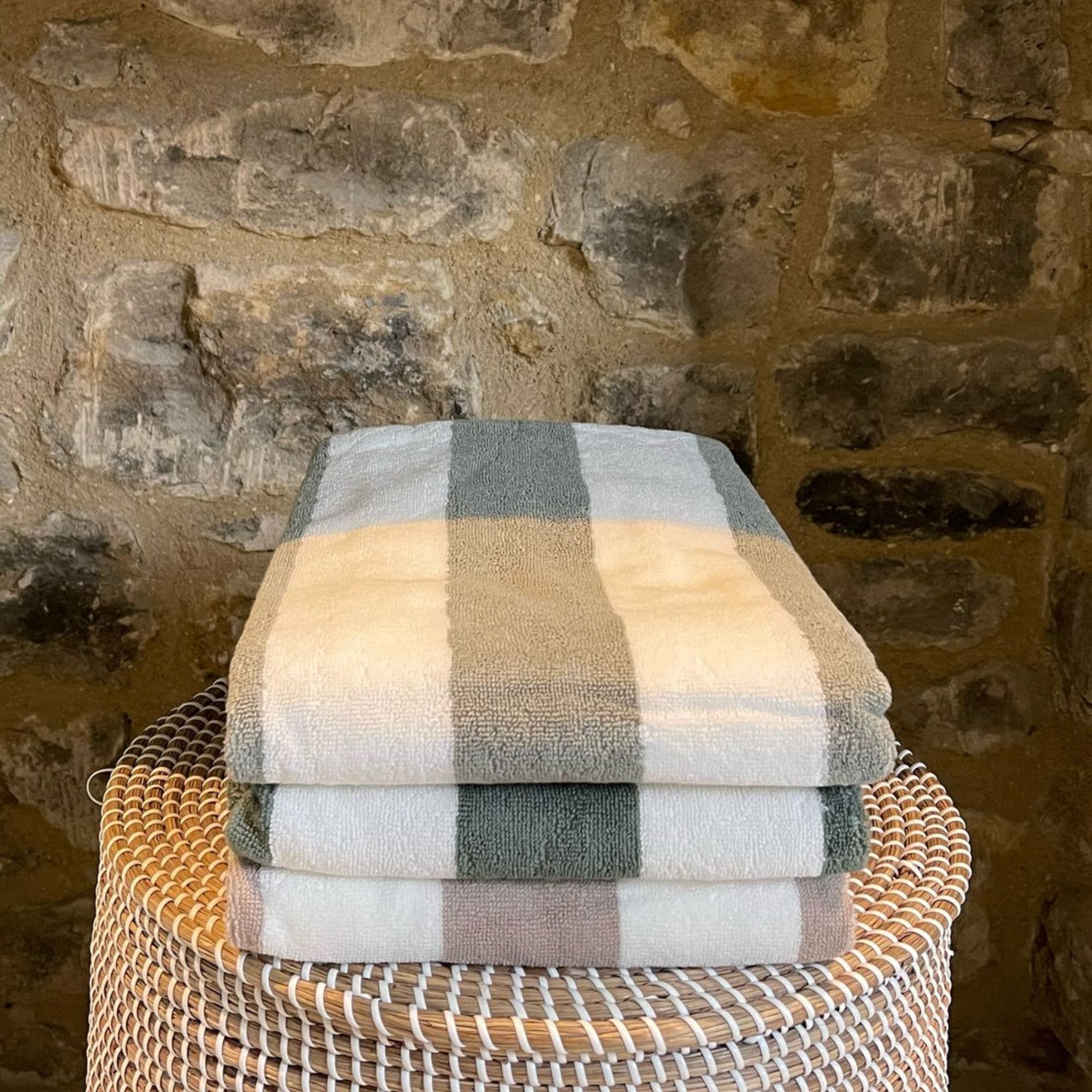
RRP: £9.99 | Material: cotton | Dimensions: 70 x 140 cm | Colour options: sage, grey, beige, black, pink | GSM: 480
+ Incredible price point
+ Stylish design with hanging hooks
- Might not be the most durable
At a glance, you wouldn’t place these as the ‘most affordable’ bath towels. Most stylish? Yes. Most versatile? Yes. Most desirable? Absolutely yes. So, with a price tag as low as this one, it’s a no-brainer. Each towel is crafted from pure cotton and comes with a useful hanging loop, so you get quality and convenience. The terry might not be the most absorbent on this list, but it’s nonetheless effective at cocooning you out of the shower.
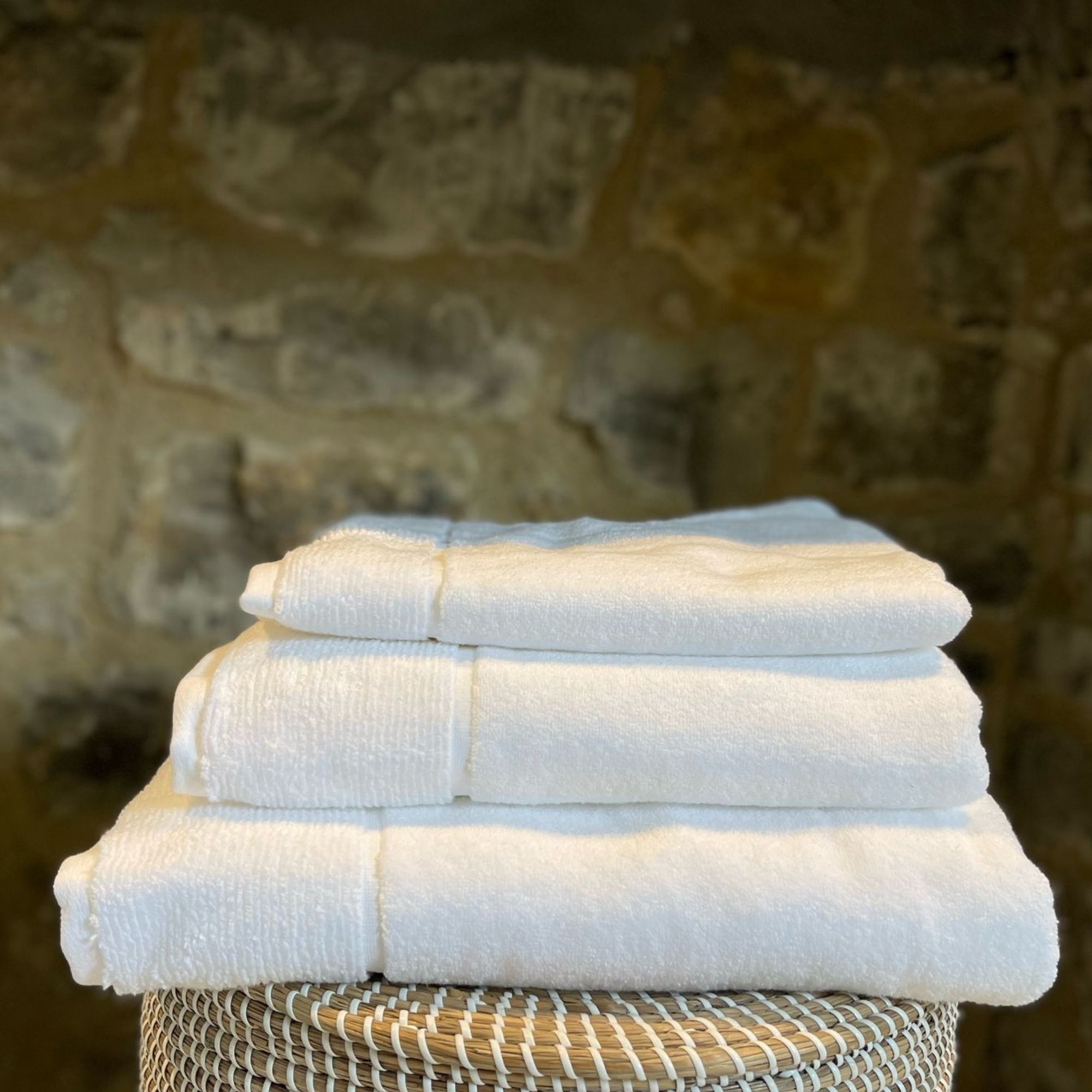
RRP: £89-178 | Material: Egyptian cotton | Dimensions: 70 x 125 cm | Colour options: dark grey, light grey, pink, white | GSM: 650
+ Easy for a new home refresh
+ Feel premium and luxurious
- Only available as a set
Whether you’re setting up a new home or looking for a towel refresh, this Egyptian cotton set is perfect. You cover bath towels, hand towels, and face towels in one. I’ve been using these for two years and they're as fluffy as ever. My ones from The White Company are more absorbent, but these are brilliant for fake tan and their size and colour longevity is remarkable.
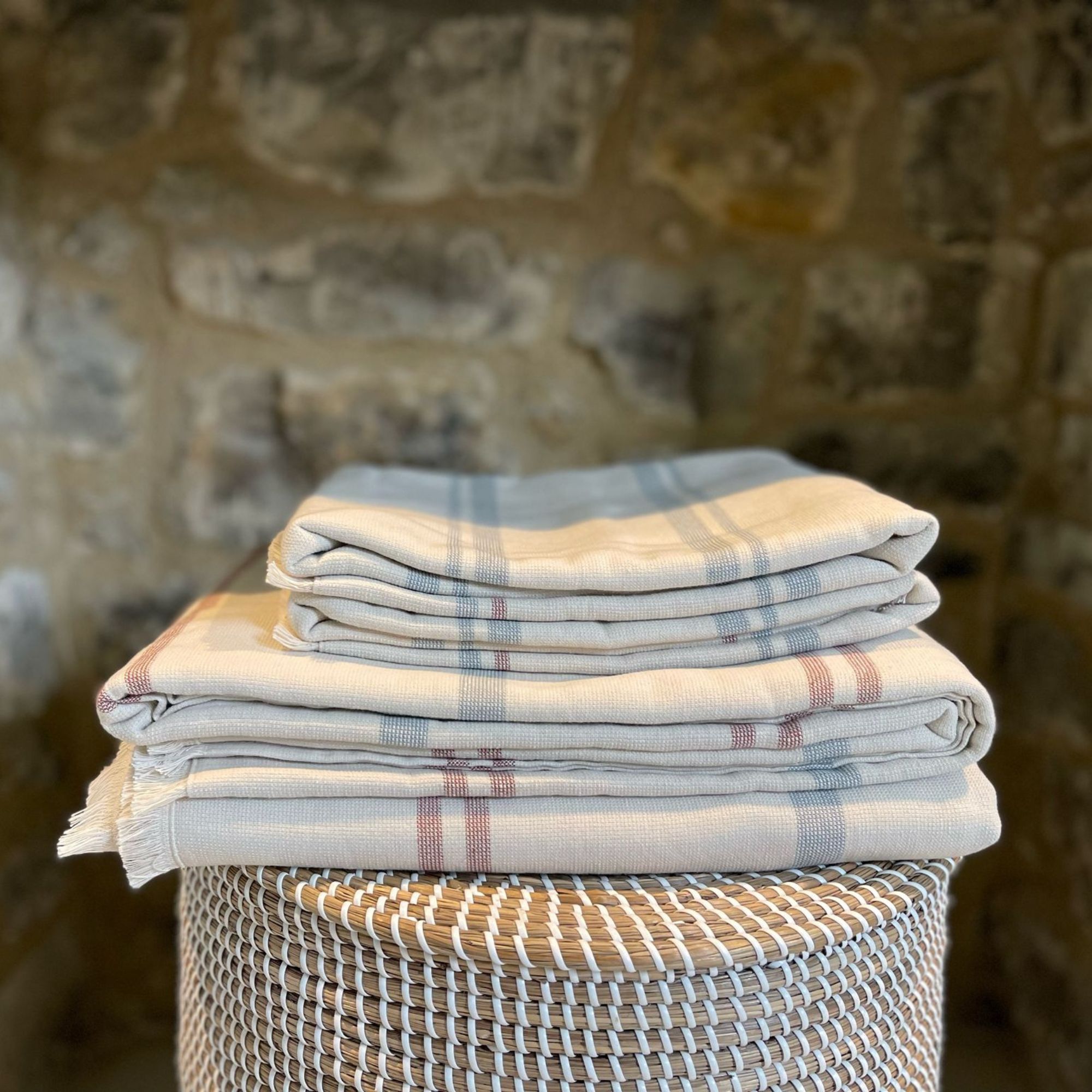
RRP: £54 | Material: cotton | Dimensions: 100 x 150 cm | Colour options: blue and red | GSM: 700
+ Dual-texture design
+ Beautiful weight and feel
- Expensive
Turkish towels are known for their softness, absorbency, and durability — they often have longer thread lengths than cotton — so you can put them through the wringer a little more. I love the gentle, nostalgic blue and red striped style of these — they’ve got a high GCM for Turkish towels too, which means you get even better quality. One side is terry and one side is flat weave, perfect for quick, efficient drying as well as softer, more gentle styles too. They’re a splurge, but worth it for little moments of luxury indulgence.
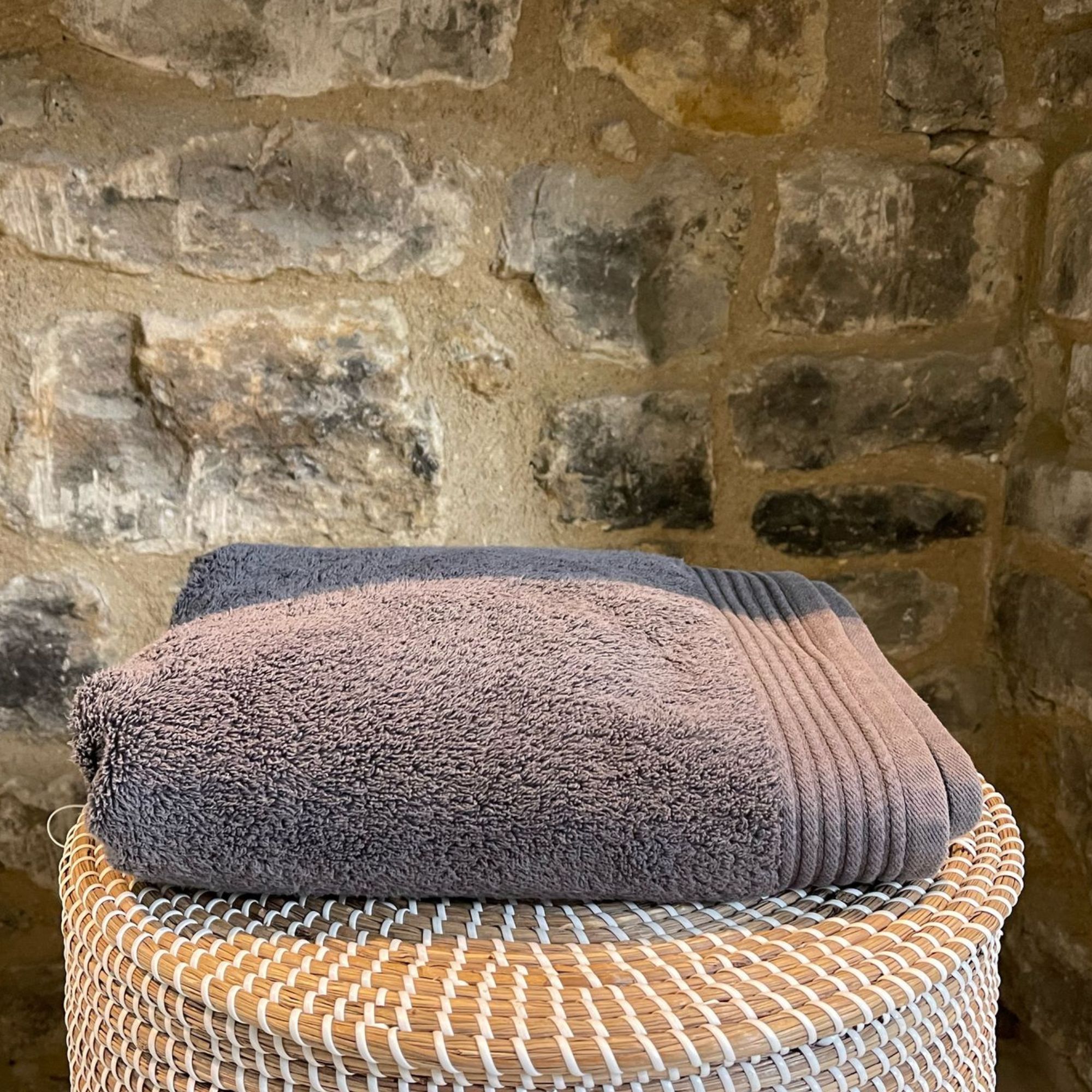
RRP: £25 | Material: cotton | Dimensions: 70 x 130 cm | Colour options: white, light grey, dark grey | GSM: 500
+ Stylish, versatile design
+ Feels super soft
- Not as absorbent as others
These Monaco towels don't give the tanning game away. Crafted from 100% cotton, they have a slightly lighter 500 GSM, zero twist weave, and super soft feel. This means that they won't scape your fake tan off your skin, instead, they'll pat you dry in double-quick time. Opting for light grey or dark grey will keep your towels looking fresh, but these can stand a hot wash if you end up getting tan on the white colourway too.

RRP: £14 | Material: Egyptian cotton | Dimensions: 70 x 125 cm | Colour options: endless | GSM: 600
+ Endless colour options
+ Classic design
- Availability is tricky at the moment
Where else could you look for classic towels that come without compromise? M&S is simply perfect as a place to buy a good quality staple. Their Egyptian cotton has the credentials of towels that should cost twice, if not three times the price, and all of the cotton is sustainably sourced too. After putting it through ten washes, the towels are just as fluffy and soft as ever which they promise comes not by accident, but as a result of their StayNew technology. They don't shrink, they don't bleed colour. In fact, they don't compromise anywhere.
How we tested the best bath towels
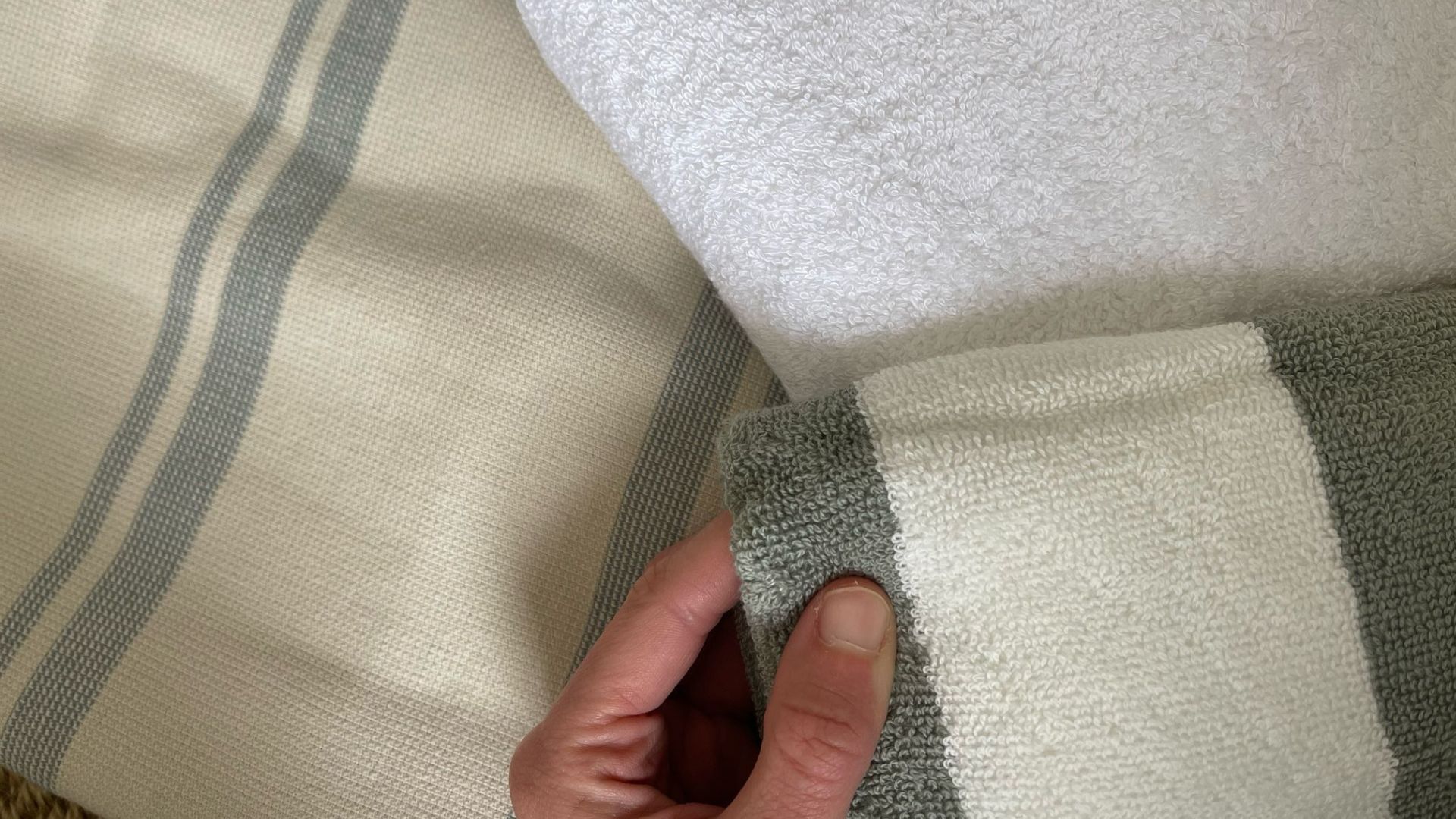
When testing the best bath towels we considered some key factors, including...
- Material: Probably the most important element of a bath towel is how the towel feels when you use it on your skin. The towels I tested were all made from cotton or bamboo, from cotton terry to Egyptian cotton. High-quality materials - and bonus points if they were ethically and sustainably produced - are integral when choosing a new bath towel.
- GSM: Used to measure the weight and absorbency of a towel, GSM refers to how 'heavy' the material is. Luxury towels are often made from a higher GSM, and therefore have a thicker, fluffier feel.
- Absorbency: However, a high GSM doesn't always convert to a supremely absorbent towel. We tested how quickly the bath towels drew in moisture, as well as how efficient they were at self-drying - did the towel feel heavy and damp after use, or did it retain a lightweight feel even after absorbing water?
- How well did the towel wash and dry?: There are few things more frustrating than investing in a super-soft, fluffy towel, before seeing it become hard and scratchy after being washed and dried. While I didn't test these towels with a tumble-dryer, I noted how well they fared in the washing machine without shrinking, and when air-drying.
- RRP: High-quality bath towels don't need to break the bank, but you will likely pay more for a thicker, more luxurious feel. I tested the value for money for these towels, and how they stood up against the claims made about their quality.
FAQs
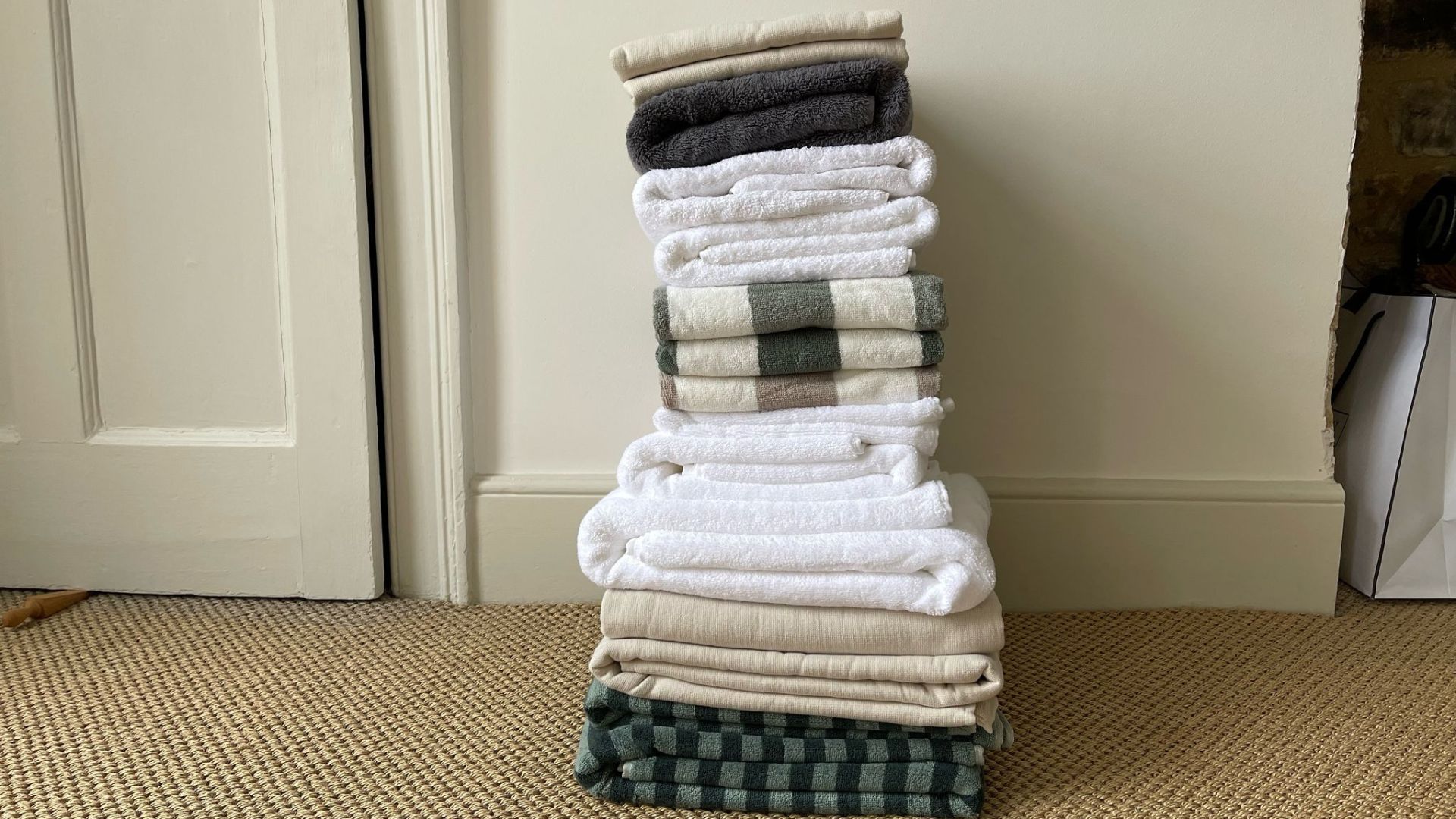
What is GSM?
Robert Lancaster-Gaye, co-founder of Tielle, tells us that "GSM is the weight of a towel measured in grams per square meter. Typically, the higher a towel's GSM, the heavier, fluffier and more absorbent it will be".
However, he notes that GSM isn't the only factor to look out for when choosing a towel: "A 550 GSM towel made from high-quality, long staple yarn will outperform an inferior 650 GSM towel any day". He explains that "a high-quality 550-650 GSM towel is generally considered the best for spas and 5-star hotel towels".
What are the main types of cotton?
"Essentially, cotton is cotton", says Lancaster-Gaye. "But it's the length of the yarn that makes all the difference". He favours "Turkish cotton, which is a premium long-fibre cotton that produces smoother, stronger towels", but there are several other types of cotton commonly used in the making of towels, from cotton terry to Egyptian cotton.
Why is my towel crispy?
Crispy towels are never pleasant, so I asked the experts why you might find yours is a little crunchy. Tommy-Joe Reardon, Head of Marketing at Panda, explained that "if you live in a hard water area, this is definitely a factor in finding your towels have a lack of softness. They can also go crispy due to a build up of laundry detergent and fabric softener, or if your tumble dryer setting is too high. Opt for a lower temperature, as tumble drying is best when using fabric conditioner. This is where bamboo comes out on top – it gets softer with every wash without any fabric softener."
What is the best way to wash a towel?
Tommy-Joe Reardon, Head of Marketing at Panda, explains, "the best way to wash towels is typically in a smaller load (e.g. without clothes) at around 40 degrees Celsius with a small amount of good quality detergent. And it might seem counterintuitive, but take care to avoid using fabric softener – this can actually clog towel fibres, which leads to that crispy feeling and can reduce absorbency over time."
Sign up to our free daily email for the latest royal and entertainment news, interesting opinion, expert advice on styling and beauty trends, and no-nonsense guides to the health and wellness questions you want answered.

Laura is woman&home's eCommerce editor, in charge of testing, reviewing and creating buying guides for the Homes section, so you'll usually see her testing everything from the best dehumidifiers to sizing up the latest Le Cruset pot. Previously, she was eCommerce editor at Homes & Gardens magazine, where she specialised in covering coffee and product content, looking for pieces tailored for timelessness. The secret to her heart is both simplicity and quality. She is also a qualified Master Perfumer and holds an English degree from Oxford University. Her first editorial job was as Fashion writer for The White Company.